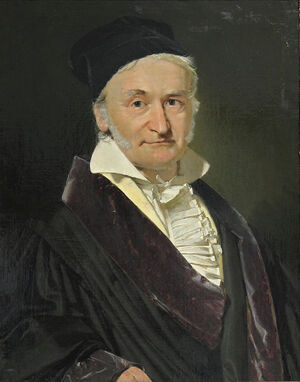Carl Friedrich Gauss (nonfiction): Difference between revisions
Jump to navigation
Jump to search
No edit summary |
No edit summary |
||
| Line 1: | Line 1: | ||
[[File:Carl_Friedrich_Gauss_1840_by_Jensen.jpg|thumb|Johann Carl Friedrich Gauss.]]'''Johann Carl Friedrich Gauss''' (/ɡaʊs/; German: Gauß, pronounced [ɡaʊs] Latin: ''Carolus Fridericus Gauss'') (30 April 1777 Braunschweig – 23 February 1855 Göttingen) was a German [[Mathematician (nonfiction)|mathematician]] who contributed significantly to many fields, including number theory, algebra, statistics, analysis, differential geometry, geodesy, geophysics, mechanics, electrostatics, astronomy, matrix theory, and optics. | [[File:Carl_Friedrich_Gauss_1840_by_Jensen.jpg|thumb|Johann Carl Friedrich Gauss.]]'''Johann Carl Friedrich Gauss''' (/ɡaʊs/; German: Gauß, pronounced [ɡaʊs] Latin: ''Carolus Fridericus Gauss'') (30 April 1777 Braunschweig – 23 February 1855 Göttingen) was a German [[Mathematician (nonfiction)|mathematician]] who contributed significantly to many fields, including [[Number theory (nonfiction)|number theory]], algebra, statistics, [[Mathematical analysis (nonfiction)|analysis]], [[Differential geometry (nonfiction)|differential geometry]], geodesy, geophysics, mechanics, electrostatics, astronomy, matrix theory, and optics. | ||
Sometimes referred to as the ''Princeps mathematicorum'' (Latin, "the foremost of mathematicians") and "greatest mathematician since antiquity", Gauss had an exceptional influence in many fields of mathematics and science and is ranked as one of history's most influential mathematicians. | Sometimes referred to as the ''Princeps mathematicorum'' (Latin, "the foremost of mathematicians") and "greatest mathematician since antiquity", Gauss had an exceptional influence in many fields of mathematics and science and is ranked as one of history's most influential [[Mathematician (nonfiction)|mathematicians]]. | ||
== In the News == | == In the News == | ||
| Line 9: | Line 9: | ||
== Fiction cross-reference == | == Fiction cross-reference == | ||
* [[Crimes against mathematical constants]] | |||
* [[Gnomon algorithm]] | |||
* [[Mathematics]] | |||
== Nonfiction cross-reference == | == Nonfiction cross-reference == | ||
* [[ | * [[Mathematician (nonfiction)]] | ||
* [[Sophie Germain (nonfiction)]] | * [[Sophie Germain (nonfiction)]] | ||
* [[Theorema Egregium (nonfiction)]] | |||
External links: | External links: | ||
Revision as of 12:55, 2 February 2018
Johann Carl Friedrich Gauss (/ɡaʊs/; German: Gauß, pronounced [ɡaʊs] Latin: Carolus Fridericus Gauss) (30 April 1777 Braunschweig – 23 February 1855 Göttingen) was a German mathematician who contributed significantly to many fields, including number theory, algebra, statistics, analysis, differential geometry, geodesy, geophysics, mechanics, electrostatics, astronomy, matrix theory, and optics.
Sometimes referred to as the Princeps mathematicorum (Latin, "the foremost of mathematicians") and "greatest mathematician since antiquity", Gauss had an exceptional influence in many fields of mathematics and science and is ranked as one of history's most influential mathematicians.
In the News
Fiction cross-reference
Nonfiction cross-reference
External links:
- Carl Friedrich Gauss @ Wikipedia
